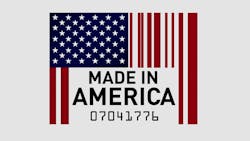US Security at Risk Due to Foreign Suppliers, AAM Report Warns
U.S. national security and the health of its defense industrial base are “threatened by our military’s growing and dangerous reliance on foreign nations for the raw materials, parts, and finished products needed to defend the American people,” according to a new report issued by the Alliance for American Manufacturing.
“Remaking American Security:Supply Chain Vulnerabilities & National Security Risks Across the U.S. Defense Industrial Base,” authored by Guardian Six Consulting President Brigadier General John Adams, warns that “foreign sourcing puts America’s military readiness in the hands of potentially unreliable supplier nations and undermines the ability to develop capabilities needed to win on future battlefields.”The report calls for action to increase domestic production of the natural resources and manufactured goods necessary to equip the U.S. military.
“America’s vulnerability today is frightening,” said Adams. “This report is a wake-up call for America to pay attention to the growing threat posed by the steady deterioration of our defense industrial base. Excessive and unwise outsourcing of American manufacturing to other nations weakens America’s military capability. As a soldier, I’ve witnessed firsthand the importance of our nation’s ability to rapidly produce and field a sophisticated array of capabilities. There is a real risk that supply chain vulnerabilities will hamper our response to future threats.”
The report lists a number of examples where it maintains U.S. military capability is threatened by a dependence on foreign suppliers:
• The U.S. relies on a single Chinese company for the chemical butanetriol (BT) needed to produce the solid rocket fuel used to propel HELLFIRE air-to-ground missiles. HELLFIRE missiles are launched from attack helicopters and unmanned drones. The last U.S. producer of BT, Cytec Industries, discontinued production in 2004.
• The United States imports 91% of the rare earth element lanthanum, which is needed to make night-vision devices, from China. The report warns this “near-total dependence creates a risk that China could withhold access to lanthanum to force up the price, inhibit a U.S. technological advantage, pressure the United States to resolve disputes on terms favorable to China, or worse, completely withhold supplies.” Night-vision devices give U.S. warfighters a critical advantage in low-light operations, such as the night raid that resulted in the death of Osama bin Laden.
• Lithium ion batteries are used in unmanned aerial drones, bomb disposal robots and various gear employed by U.S. soldiers. Although the original invention of the Li-ion battery took place in U.S. laboratories funded by the federal government, the commercialization of these batteries has moved offshore, with 57% of the LI-ion batteries produced in Japan, followed by South Korea and China with 17% and 13% respectively. The United States, which produces just 2% of these batteries, is now at a competitive disadvantage, relying on foreign suppliers for both current products and next generation batteries.
• Production of high-tech magnets has migrated offshore, even though American research initially developed this technology. Today, there is no domestic Neodymium-Iron-Boron (NdFeB) magnet producer, and 75% of NdFeB magnets are fabricated in China. The disappearance of a U.S. magnet industry, the report says, has eroded U.S. leadership in patents and its ability to design new applications.
“As the U.S. pivots its defense posture to focus on Asia, procurement policies that allow, or in some cases encourage, sourcing of critical defense materials from China and other potentially unreliable suppliers don’t make sense,” said Scott Paul, AAM’s president. “Self-reliance has always been an American virtue and the key to our nation’s success and prosperity. Manufacturing is important for job creation and a strong economy, and it’s also essential for our national security.”
Recommendation to Reduce Dependence on Imported Products
The report includes 10 recommendations to foster domestic manufacturing capacity and make the U.S. military less dependent on imported products:
• Increase long-term federal investment in high-technology industries, particularly those involving advanced research and manufacturing capabilities;
• Properly update, apply and enforce existing laws and regulations to support the U.S. defense industrial base;
• Develop domestic sources of key natural resources that U.S. armed forces require;
• Ensure that defense industrial base concerns are considered at the highest levels when formulating the U.S. National Military Strategy, National Security Strategy and throughout the Quadrennial Defense Review process;
• Build consensus among government, industry, the defense industrial base workforce and the military on the best ways to strengthen the defense industrial base;
• Increase cooperation between federal agencies and between government and industry to build a healthier defense industrial base;
• Strengthen collaboration between government, industry and academic research institutions to educate, train and retain people with specialized skills to work in key defense industrial base sectors;
• Craft legislation to support a broadly representative defense industrial base strategy;
• Modernize and secure defense supply chains through networked operations that provide ongoing communications between prime contractors and the supply chains they depend on; and
• Identify potential defense supply chain chokepoints and planning to prevent disruptions.
About the Author
IW Staff
Find contact information for the IndustryWeek staff: Contact IndustryWeek
